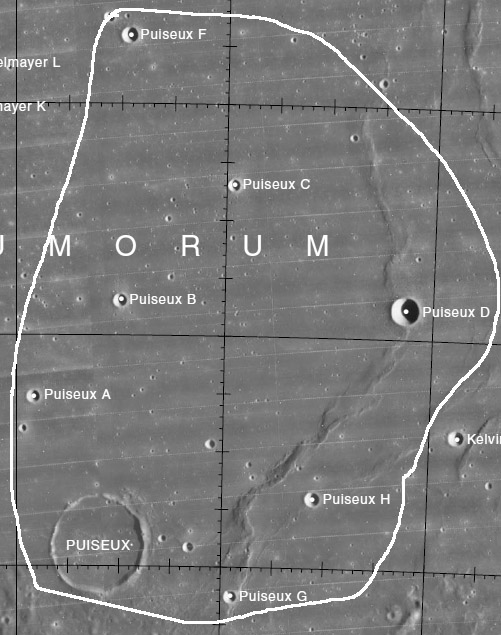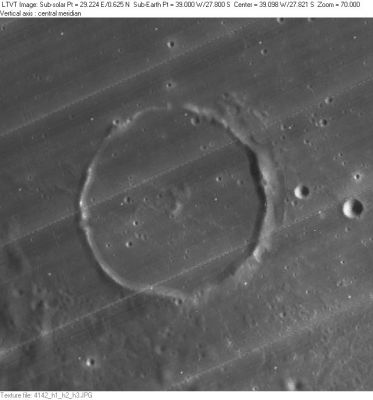Puiseux
Contents
Puiseux
|
Lat: 27.8°S, Long: 39.0°W, Diam: 24 km, Depth: 0.34 km, Rükl: 52 |
Images
LPOD Photo Gallery Lunar Orbiter Images
Maps
(LAC zone 93C1) LAC map Geologic map
Description
Description: Wikipedia
Additional Information
Depth data from Kurt Fisher database
- Westfall, 2000: 0.34 km
- Viscardy, 1985: 0.4 km
- Satellite crater Puiseux D is on the ALPO list of bright ray craters.
Nomenclature
- Named for Pierre Puiseux (1855-1928), a French astronomer. Puiseux, with Loewy, compiled the Paris Observatory's Atlas Photographique de la Lune, one of the first comprehensive photographic atlases of the Moon, appearing between 1896 and 1910. He also published a 1908 book on comparative lunar and terrestrial geology, La terre et la lune, which includes examples of early artificial impact cratering experiments by Hermann Alsdorf, as well as doing theoretical work on tidal acceleration and the Moon's oscillations about its center of gravity.
- This feature was Catalog number 2382 in Mary Blagg's Collated List where all three authorities adopted the convention of Beer and Mädler, calling it Doppelmayer c.
- In the original IAU nomenclature of Named Lunar Formations (1935) the name was changed to Puiseux, adopting a proposal by Krieger and König.
- According to the introductory material to Named Lunar Formations, Pierre Puiseux was a long-standing member of the committees overseeing the international consolidation of lunar nomenclature (nearly all of whom have themselves been honored by the IAU with crater names).
- Pierre Puiseux was the son of the equally (or even more) famous Victor Puiseux, who made substantial contributions to celestial mechanics, including lunar theory, but the lunar name does not appear to honor him.
Lettered Craters

Excerpt from the USGS Digital Atlas of the Moon.
LPOD Articles
Bibliography
- Puiseux, Pierre Henri (obituary notice)
P. Puiseux in the Sourcebook Project (William R. Corliss)
- In Mysterious Universe, a handbook of astronomical anomalies (1979) :
- Page 30: The Reaction of the Planets upon the Sun (Popular Astronomy, 1915).
